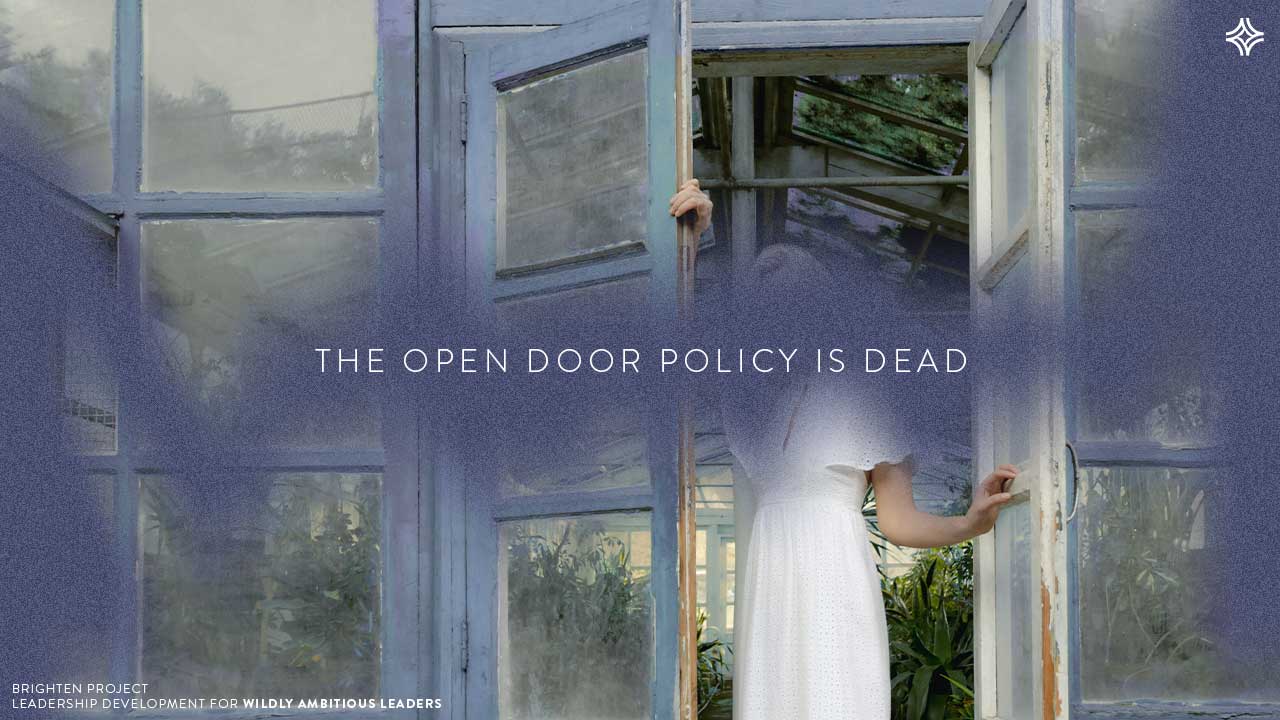
The Open Door Policy is dead (or it should be)
Aug 13, 2023VICTORIA BROWN | AUGUST 2023
I'm calling it - the "Open Door" policy is dead - or it should be anyway.
Sure it has good intentions - when managers say "I've got an open door policy" what they're really saying is that "I'm available to you, whenever you need to for questions or support.". How can you fault that? You can't. It's about being approachable, about being available and being supportive. Having an "open door" can physically mean that the door to your office is aways open and people should feel free to come and chat with you, but in the digital sense it also means that your team comms channels like Slack or Teams are always open and teams can expect a response from you whenever they message.
The problem?
"Constant Interruptions = Productivity Killer."
Being "always available" means you're saying - "interrupt me anytime". As leaders, our time management and where we choose to invest our time and focus is the single most important decision we'll make each day when it comes to our workflow. There are very few leadership roles where all you have to do is to support your team, that sounds amazing but it's not reality. In reality, we often have our own workflow that needs to managed in tandem with supporting our team. We also have to be managing ourselves effectively to deliver good work and be able to think with clarity. You can't do that, if you're constantly open for interruptions all day.
According to Gallup: "The average amount of time that people spent on any single event before being interrupted or before switching was about three minutes. Actually, three minutes and five seconds, on average". How much effective, clear thinking and decision making or specific effort can be made on a project in three minutes?
Why it's time to "yuck" the Open Door Policy.
- Quality Over Quantity: An always-open door might lead to more frequent, but superficial, conversations rather than in-depth, quality discussions with your colleagues and your direct reports.
- Boundary Blur: It can be hard to maintain a professional boundary when there's a feeling of constant accessibility, and it can pull you from your own work, swallow up your important focusing and planning time which can lead to burnout and overextension for leaders.
- Creates Ambiguity: Having an open door doesn't always mean issues get resolved. Employees may not always understand the proper channels for specific concerns. A structured approach to communication might provide clearer solutions.
- Over-dependency: There's a potential risk that employees become over-reliant on leadership for all decisions, big or small, undermining their ability to handle situations independently. This was mentioned in a Harvard Business Review article, suggesting that an open door policy might prevent the development of problem-solving skills among junior team members. We want our people to think for themselves and use you as a soundboard rather than you being the oracle that must solve all questions.
What to do instead?
- Scheduled Openness: Introduce the concept of setting specific times for open discussions, ensuring both preparedness and genuine engagement. This is a GREAT time to get your teams used to using their 1:1s to ask/discuss. If they come to you with a question that's not urgent, gently ask if that can go onto the 1:1 agenda, and you can tackle it then. In one of my previous roles, we were in a large global corporate business and my marketing team outperformed marketing teams all around the world because we were SO efficient. One of the biggest factors for us was that we respected each others time. We used connection points to align, for example weekly meetings, and then only interrupted each other during the day when it was an emergency.
- Digital Open Doors: For online tools like Slack or Teams, make sure theres clear rules and expectations set. How often do people check it, how quickly are responses expected etc.
It's not about closing doors; it's about opening them intentionally.
What I want you to do this week: Observe yourself. How focused are you able to be? How often do you get interrupted? Are expectations on availability clear and aligned between yourself and your team?
VB
-
🚀 Learn to focus and lead with intention and clarity: Epic Leader Accelerator Program
